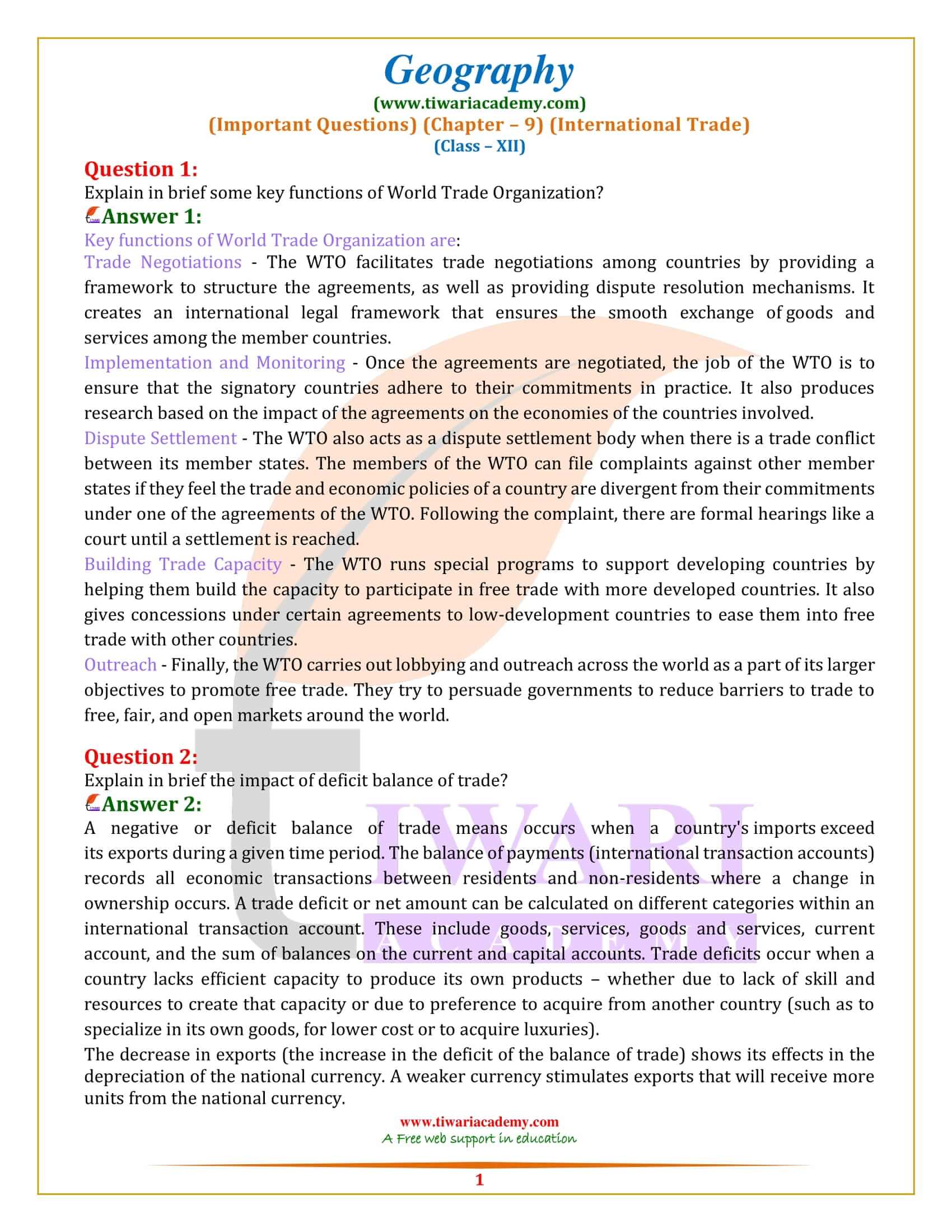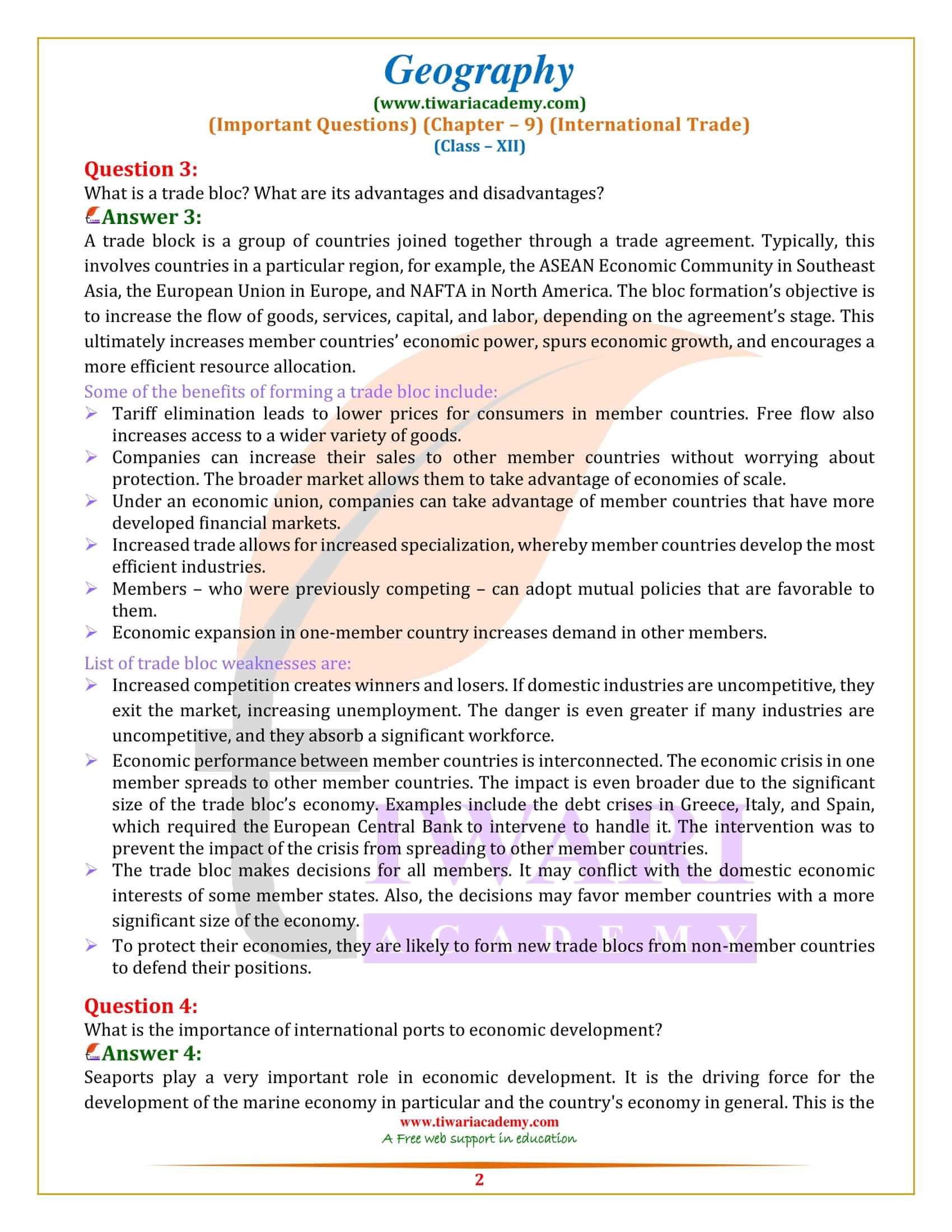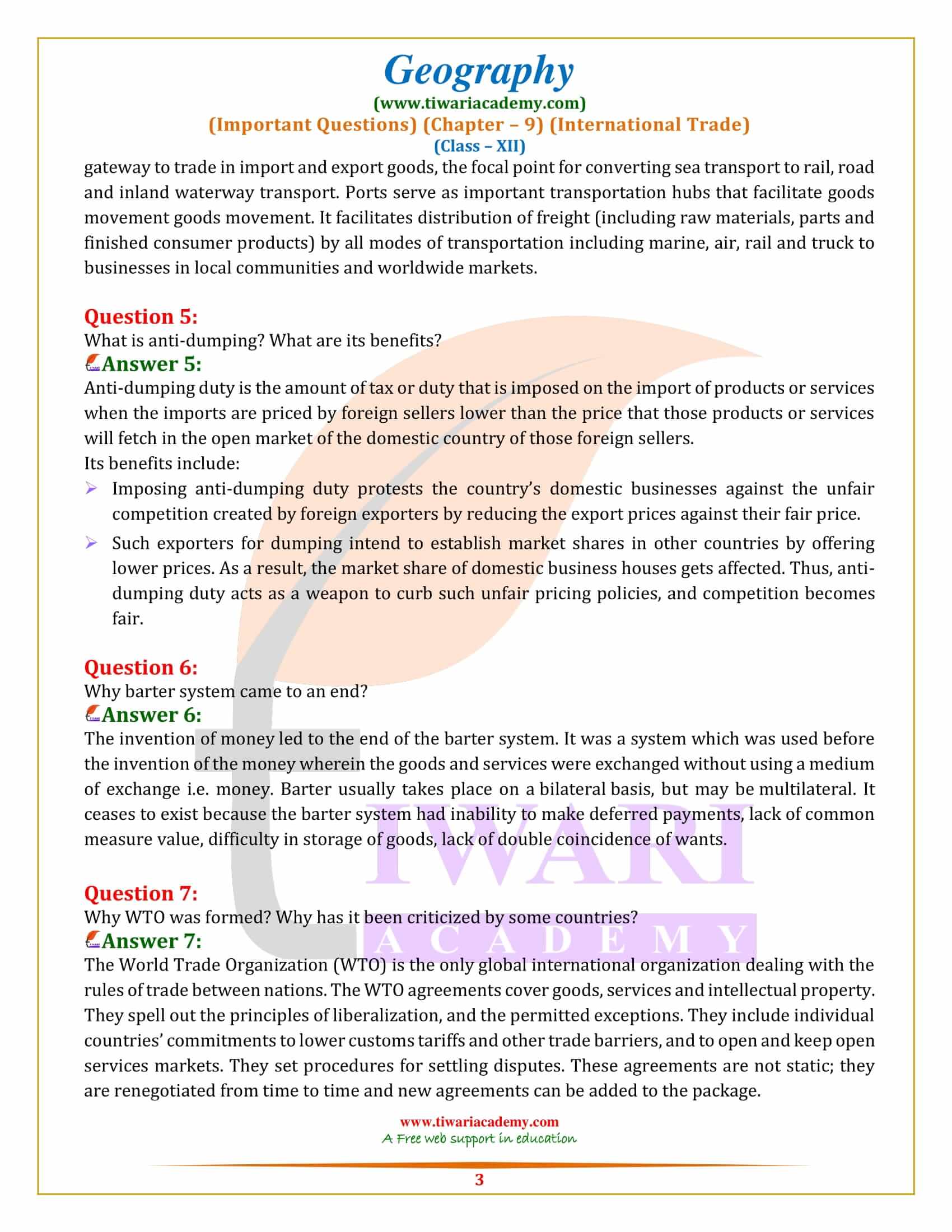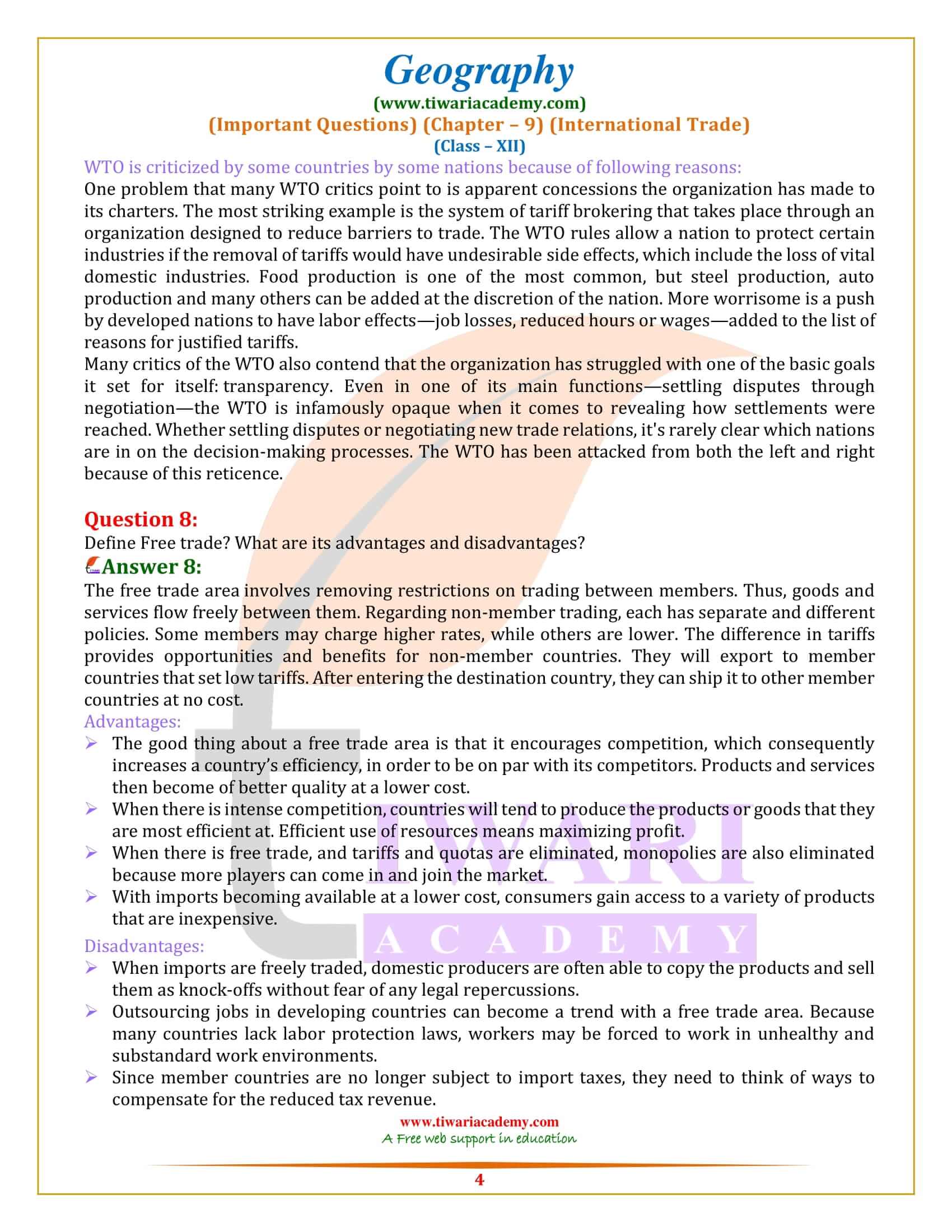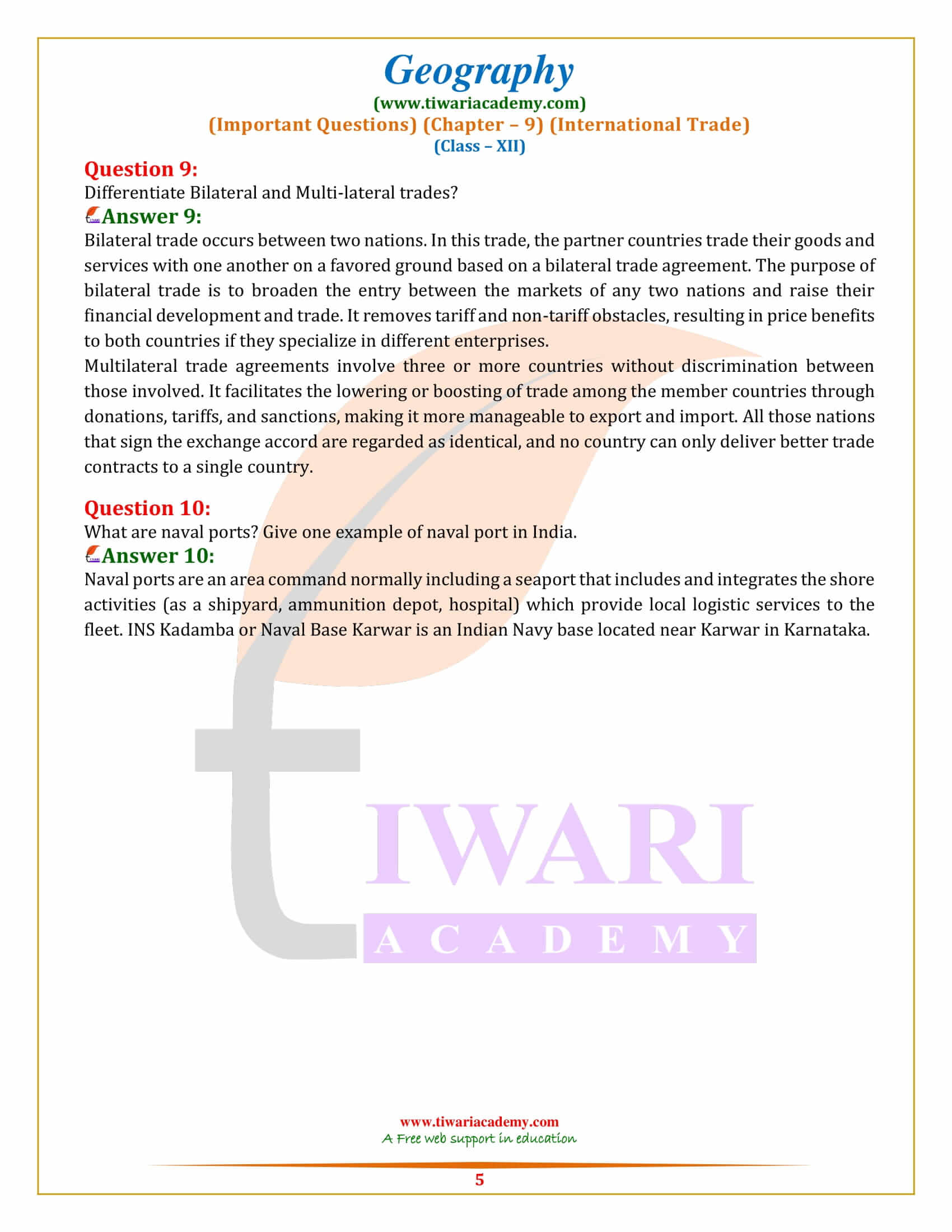NCERT Solutions for Class 12 Geography Chapter 9 Important Questions of International Trade updated for CBSE and State board students session 2025-26. Class 12 Geography Fundamentals of Human Geography chapter 9 extra questions includes all important question answers of the chapter.
Class 12 Geography Chapter 9 Important Questions
Class 12 Geography Chapter 9 Important Extra Question Answers
Explain in brief some key functions of World Trade Organization?
Key functions of World Trade Organization are:
Trade Negotiations – The WTO facilitates trade negotiations among countries by providing a framework to structure the agreements, as well as providing dispute resolution mechanisms. It creates an international legal framework that ensures the smooth exchange of goods and services among the member countries.
Implementation and Monitoring – Once the agreements are negotiated, the job of the WTO is to ensure that the signatory countries adhere to their commitments in practice. It also produces research based on the impact of the agreements on the economies of the countries involved.
Dispute Settlement – The WTO also acts as a dispute settlement body when there is a trade conflict between its member states. The members of the WTO can file complaints against other member states if they feel the trade and economic policies of a country are divergent from their commitments under one of the agreements of the WTO. Following the complaint, there are formal hearings like a court until a settlement is reached.
Building Trade Capacity – The WTO runs special programs to support developing countries by helping them build the capacity to participate in free trade with more developed countries. It also gives concessions under certain agreements to low-development countries to ease them into free trade with other countries.
Outreach – Finally, the WTO carries out lobbying and outreach across the world as a part of its larger objectives to promote free trade. They try to persuade governments to reduce barriers to trade to free, fair, and open markets around the world.
Explain in brief the impact of deficit balance of trade?
A negative or deficit balance of trade means occurs when a country’s imports exceed its exports during a given time period. The balance of payments (international transaction accounts) records all economic transactions between residents and non-residents where a change in ownership occurs. A trade deficit or net amount can be calculated on different categories within an international transaction account. These include goods, services, goods and services, current account, and the sum of balances on the current and capital accounts.
Trade deficits occur when a country lacks efficient capacity to produce its own products – whether due to lack of skill and resources to create that capacity or due to preference to acquire from another country (such as to specialize in its own goods, for lower cost or to acquire luxuries).
The decrease in exports (the increase in the deficit of the balance of trade) shows its effects in the depreciation of the national currency. A weaker currency stimulates exports that will receive more units from the national currency.
What is the importance of international ports to economic development?
Seaports play a very important role in economic development. It is the driving force for the development of the marine economy in particular and the country’s economy in general. This is the gateway to trade in import and export goods, the focal point for converting sea transport to rail, road and inland waterway transport. Ports serve as important transportation hubs that facilitate goods movement goods movement. It facilitates distribution of freight (including raw materials, parts and finished consumer products) by all modes of transportation including marine, air, rail and truck to businesses in local communities and worldwide markets.
What is anti-dumping? What are its benefits?
Anti-dumping duty is the amount of tax or duty that is imposed on the import of products or services when the imports are priced by foreign sellers lower than the price that those products or services will fetch in the open market of the domestic country of those foreign sellers.
Its benefits include:
- Imposing anti-dumping duty protests the country’s domestic businesses against the unfair competition created by foreign exporters by reducing the export prices against their fair price.
- Such exporters for dumping intend to establish market shares in other countries by offering lower prices. As a result, the market share of domestic business houses gets affected. Thus, anti-dumping duty acts as a weapon to curb such unfair pricing policies, and competition becomes fair.
Why barter system came to an end?
The invention of money led to the end of the barter system. It was a system which was used before the invention of the money wherein the goods and services were exchanged without using a medium of exchange i.e. money. Barter usually takes place on a bilateral basis, but may be multilateral. It ceases to exist because the barter system had inability to make deferred payments, lack of common measure value, difficulty in storage of goods, lack of double coincidence of wants.
Differentiate Bilateral and Multi-lateral trades?
Bilateral trade occurs between two nations. In this trade, the partner countries trade their goods and services with one another on a favored ground based on a bilateral trade agreement. The purpose of bilateral trade is to broaden the entry between the markets of any two nations and raise their financial development and trade. It removes tariff and non-tariff obstacles, resulting in price benefits to both countries if they specialize in different enterprises.
Multilateral trade agreements involve three or more countries without discrimination between those involved. It facilitates the lowering or boosting of trade among the member countries through donations, tariffs, and sanctions, making it more manageable to export and import. All those nations that sign the exchange accord are regarded as identical, and no country can only deliver better trade contracts to a single country.
